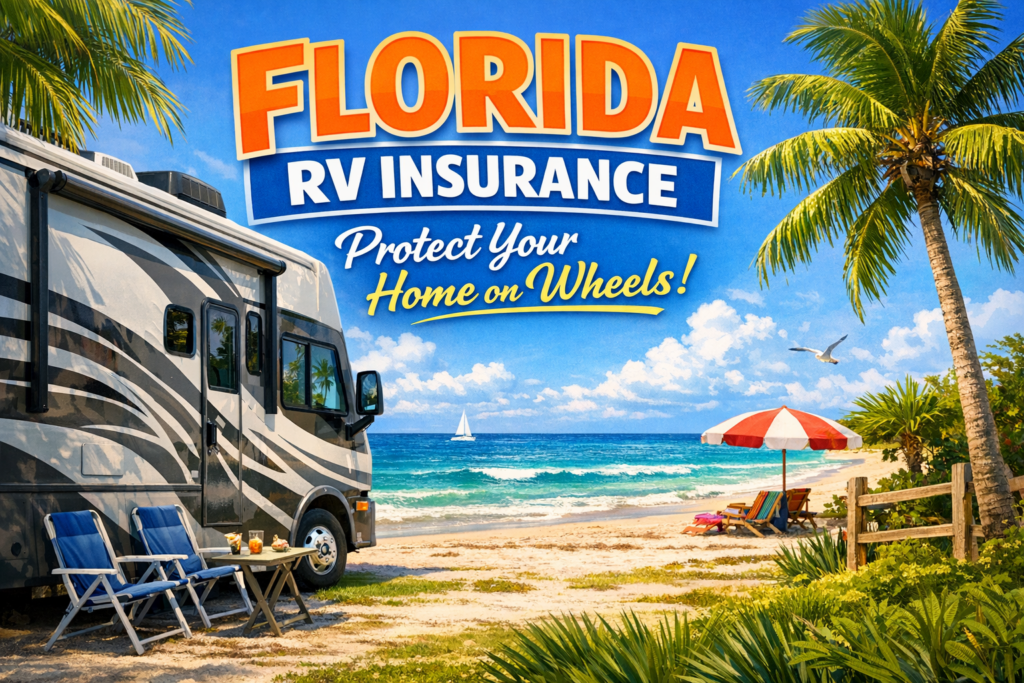
Florida is a dream destination for many RV enthusiasts. The sunny weather, endless coastlines, and scenic parks make it perfect for road trips and vacations. However, driving and owning an RV in the Sunshine State comes with unique insurance needs. Understanding Florida RV insurance can help owners protect their investment and travel with peace of mind. Whether you are new to RV life or a seasoned traveler, it is important to know what coverage is best for you.
What Is Florida RV Insurance and Why Do You Need It
Florida RV insurance is a specialized policy designed for recreational vehicles. Unlike standard auto insurance, it covers both the vehicle and the living quarters inside. Many RVs are used as both transportation and a home on wheels, so the insurance must cover more than just accidents on the road. Florida law requires certain minimum coverage for all vehicles, but RV owners often need extra protection. With the right insurance, you can avoid costly repairs or losses from accidents, theft, or natural disasters.
Owning an RV in Florida exposes you to unique risks. Hurricanes, heavy storms, and flooding are more common in Florida than in many other states. RVs can be expensive to repair or replace, and personal belongings inside add further value. Insurance helps cover your investment against these local risks. Accidents can also happen while driving or camping, and liability coverage can protect you from lawsuits or claims if someone is injured near your RV.
Many RV owners also need insurance for peace of mind. When you are traveling across Florida or even out of state, you want to enjoy your trip without worry. Insurance can help you handle unexpected situations like breakdowns or accidents. It can also cover emergency expenses, such as hotel stays or towing. With proper RV insurance, you can focus on enjoying your adventures rather than stressing over what could go wrong.
Key Coverage Options for RV Owners in Florida
There are several important coverage options to consider when insuring your RV in Florida. Liability coverage is the most basic type, and it is required by law. It pays for damages or injuries that you cause to others in an accident. Bodily injury and property damage liability are the main components of this coverage. Choosing higher limits can give you better protection, especially if you have a larger or more expensive RV.
Comprehensive and collision coverage protects your own RV. Collision covers damages from accidents with other vehicles or objects. Comprehensive pays for non-collision events like theft, vandalism, fire, or natural disasters. Since Florida is prone to hurricanes and flooding, comprehensive coverage is especially useful. You can also add coverage for your personal belongings inside the RV. This covers items like electronics, clothing, and camping gear in case of theft or damage.
Additional options include roadside assistance, emergency expense coverage, and total loss replacement. Roadside assistance can help if your RV breaks down or you need a tow. Emergency expense coverage pays for hotels or travel costs if your RV becomes unlivable during a trip. Total loss replacement is ideal for new RVs, as it pays for a brand new replacement if your RV is totaled. By exploring these options, you can build a policy that matches your needs and lifestyle.
Factors That Affect Your Florida RV Insurance Rates
Many factors can influence how much you pay for RV insurance in Florida. The type and class of your RV play a big role. Class A motorhomes are typically more expensive to insure than smaller Class B or travel trailers. The value, age, and condition of your RV will also affect your premium. Newer and more valuable RVs usually cost more to insure because repairs or replacements are more expensive.
How and where you use your RV also matters. Full-time RVers may pay more than those who only travel a few weekends each year. Insurance companies look at how often you use the RV and where you store it when not in use. Storing your RV in a secure, covered area can sometimes lower your rates. Your driving record and claim history will also impact your insurance cost. Safe drivers often qualify for lower premiums, while a history of accidents or claims can raise their rates.
Location is another important factor in Florida. Certain areas of the state are more prone to natural disasters such as hurricanes or flooding. Insurers may charge higher premiums based on your zip code or county. Some companies offer discounts if you bundle your RV policy with other insurance products like home or auto. By understanding these factors, you can make choices that help manage your insurance costs.
Tips for Choosing the Best RV Insurance Policy in Florida
Start by comparing quotes from several insurance companies. Each company may offer different coverage options and discounts. Look for an insurer with experience handling RV policies in Florida. Local expertise can make a difference during claims, especially after severe weather events. Ask about special discounts for safe driving, installing security features, or belonging to RV clubs.
Review the policy details carefully before buying. Make sure you understand what is covered and what is excluded. Pay attention to coverage limits for both your RV and your personal belongings. If you travel often or live in your RV full-time, choose a policy that covers you for both situations. Consider adding extra coverage for roadside assistance and emergency expenses for added security while traveling.
Work with an agent who knows the Florida RV market. An experienced agent can help you find the right balance between cost and coverage. They can explain the differences between policy options and help you avoid gaps in protection. Do not be afraid to ask questions or request changes to your policy as your needs change. Regularly review your coverage to make sure it still fits your RV lifestyle.
Conclusion
Protecting your RV in Florida involves more than just meeting the state’s minimum insurance requirements. The right policy can safeguard your investment from common risks like hurricanes, accidents, and theft. By understanding your coverage options, you can tailor a plan that fits your travel habits and budget. Factors like your RV type, usage, and storage location all play a part in how much you pay for insurance. Shopping around and working with knowledgeable agents can help you find the best value. Make sure to read all policy details and ask about discounts that may be available. Choosing the right RV insurance brings peace of mind so you can enjoy the freedom of the open road. Whether you are camping in the Keys or exploring the panhandle, you deserve reliable coverage. With the right preparation, your Florida RV adventures can be safer and more enjoyable for years to come.


